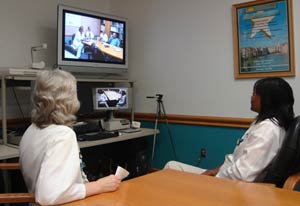Partnerships aim to build cancer expertise abroad
January/February 2011 | Volume 10, Issue 1
By Sharon Reynolds
If current trends continue, by 2020 a majority of cancer cases will occur in the developing world, according to the WHO.
This threatens to overwhelm the medical infrastructure in developing countries, where physicians often do not have access to even the most basic chemotherapy drugs or radiation therapy equipment. In addition, developing countries suffer “brain drain,” whereby physicians and researchers leave their home countries in search of facilities and funding for their work abroad. “I think human capital can often be the more challenging thing to get and maintain,” said Dr. Norman Coleman, associate director of the Radiation Research Program (RRP) at the NIH’s National Cancer Institute.

Photo courtesy of NCI
Telemedicine systems such as TELESYNERGY®,
pictured here, allow doctors on different continents
to collaborate on patient care in real time.
Since 2000, Coleman and his colleague, Dr. Bhadrasain Vikram, have been working on the idea of a Cancer Expert Corps (CEC) - a cadre of tenure-track health care professionals dedicated to committing a percentage of their time to mentoring cancer care providers and cancer researchers in the developing world and helping clinicians and researchers who want to return home to establish world-class programs.
The idea of a dedicated, long-term commitment sets the CEC apart from other mentoring efforts, explained Vikram. “A lot of times people go and give a lecture or two and maybe spend a few days somewhere. But to really make a difference, to maintain progress, you have to stay engaged in a sustained manner, for a period of years,” he said. “What is needed is a means of sustainability by which the time commitment for mentoring is a bona fide part of one’s career,” Coleman emphasized. “In-kind donations and volunteerism are welcome, but long-term commitment is crucial.”
The two radiation oncologists envision funding for the CEC mentors coming from peer-reviewed grants that individuals and institutions would compete for through mechanisms similar to standard research grants. The funding allocated for one regular full-time equivalent clinician or researcher through a typical NIH grant could fund about 20 percent of the professional time of five CEC mentors and provide financial and institutional support for their mentoring activities.
“That would make mentoring a legitimate professional track, something that’s valued by a mentor’s institution, a ‘Peace Corps for Cancer’ - people wouldn’t just have to do it on their nights and weekends,” said Coleman. “That’s what happens now - people use up their vacations, their weekends; they put all their free time into these projects and eventually they burn out.”
Modern telemedicine technology, like that adopted in 2004 with NCI support at King Hussein Cancer Center in Amman, Jordan, would allow mentors to coordinate activities such as chart rounds and quality control without extensive travel time, explained Coleman. Investment in infrastructural technology would also allow its use by physicians working in other areas of medicine, such as diabetes and cardiovascular disease, perhaps someday allowing the expansion of the concept to a broader Medical Expert Corps, he continued.
A pilot project is underway attempting to connect international mentor-mentee pairs with appropriate funding opportunities. These research pairs were identified through a call for interested participants distributed by the American Society of Clinical Oncology, the International Union Against Cancer, and other professional groups. Out of about 50 interested teams, six pairs are now working to identify grants for which they can apply.
All articles in the special Focus on Cancer section were developed by the National Cancer Institute and originally published in the NCI Cancer Bulletin and were edited for space. View the full versions of the November 30, 2010 NCI Cancer Bulletin Special Issue: Global Collaboration.
To view Adobe PDF files,
download current, free accessible plug-ins from Adobe's website.